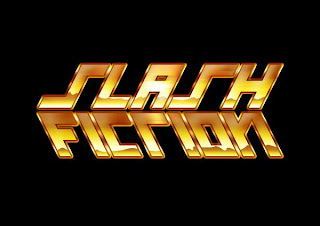Henry Jenkin III's essay "Star Trek Rerun, Reread, Rewritten: Fan Writing as Textual Poaching", from 1991, deals with the way fans interact with pop culture texts. Borrowing an idea from Michel de Certeau (consumers as "poachers"), Jenkins asserts that fans take their personal relationships to shows/texts and then share them with other fans in a process that makes the text their own through appropriation/reappropriation.
(Kirk & Spock in Star Trek: The Motion Picture)
In the final section of the essay, Jenkins writes about K/S fiction (Kirk/Spock), and writing in the early 90s, he was unable to see what a profound influence the internet has had on this subgenre. The internet provided a way for these fans of homoerotic K/S fiction to share and form a much larger community than ever before.
I came of age in the 90s. I hit puberty somewhere around '94 and was part of the first generation to experience interest in pornography and the rise of the internet at the same time. This collision enabled many young people to explore and dabble in elements of sexuality they may have never been exposed to before. I distinctly remember surfing around for naughty pics and stumbling onto a site housing nothing but "slash" fiction. I had no idea what "slash" was at the time (other than the guitarist from Guns N Roses). Hell, I barely even knew I was gay (yes, even while looking for pictures of naked men) much less the intricate and varied subcultures that were making up the "scene" at the time.
So, what is Slash Fiction? Jenkins writes about K/S fiction, in which fans write stories exploring the perceived homoerotic relationship between Captain Kirk and Mister Spock from Star Trek. Throughout the 1980s, K/S fiction began to dominate the Trek-fan fiction genre. This caused all sorts of scandal, since writing scenes of hard-core sex between beloved male, heterosexual characters is about as close to literal "character rape" as you can get. Jenkins argues that K/S fiction only does openly what all fans do covertly and that objections to K/S stem from discomfort with human sexuality.
As you may have guessed, "slash" fiction as a term evolved from the / symbol in K/S. For awhile it was interchangeable to either write Slash or K/S to denote homosexual, erotic fan fiction. By the time I stumbled upon the genre in the 90s, it was just Slash. The stories seem to have started with Star Trek in the late 70s, but soon spread to include Starsky & Hutch, Dukes of Hazzard, and other 80s series. During this time, Slash was hard to find. It was only printed in 'zines and collections. Then...the internet. Soon, slash fiction involved characters in everything from L.A. Law, Buffy, and Marvel Comics to Harry Potter, X-Files, and N'Sync. Another subgenre developed from "celebrity slash" that deals in fantasy sexual encounters between same-sex celebrity figures.
I am not a consumer of slash fiction (the novelty wore off real fast and trust me when I say these things aren't written by D.H. Lawrence), but I find it fascinating and was excited to see it's formative years explored by Jenkins in his essay. Slash fiction exists as a literal example of "poaching" from a popular text and reappropriating it for radical and subversive means.








No comments:
Post a Comment